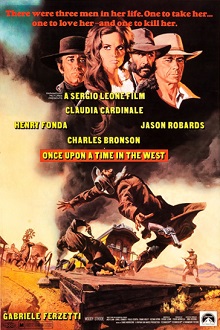I keep meaning to go back to Sergio Leone’s films but some of them are very long, making them difficult to fit into a watching schedule. This Western stars Charles Bronson as the protagonist and I believe that this was their only collaboration. It’s certainly a more complex film and the intent seems to be to obfuscate the plot and the exact role of each character. It’s a lavish production that oozes with style and achieves its remarkable length by being not afraid to let the camera linger interminably on every expression of the faces of the characters. It’s nothing special in terms of story or theme, but it does successfully frame the Western genre as a larger than life epic of mythic proportions and that is enough to qualify it as a great cinematic work.
An unnamed gunman nicknamed ‘Harmonica’ due to his habit of playing the instrument instead of talking arrives in town on a train. He is met by three men who are there to kill him but he kills them instead. Meanwhile at a remote ranch, the owner Brett McBain is expecting the arrival of his new wife Jill. Instead he and his children are killed. In both cases, the villain is Frank who is working with a businessman Morton to complete a railroad line and acquire the land in the way. Morton himself is a cripple who lives out of a railway carriage and is wary of Frank. A bandit named Cheyenne is being framed for these attacks so he wants to find out what is going on. Harmonica seems intent on vengeance against Frank for some past wrong and is uninterested in anything else. Together the two form an unspoken and uneasy alliance. Jill, who is actually a prostitute from New Orleans, inherits the ranch and decides to stay on despite the danger.
Traditionally, Westerns tell stories with stark hero and villain characters, though Leone’s films are known to muddy these roles. Once Upon a Time in America, which I believe was the last Western he ever made, takes this even further as there arguably aren’t any heroes at all and it’s ambiguous what kind of relationship Harmonica and Cheyenne have with one other. Jill is the putative damsel in distress, but is willing to hook up with Frank if that’s what it takes to survive. The story isn’t actually complicated but it does its best to remain amorphous and mysterious, refusing fall into the usual rut of a familiar plot. The imagery and Ennio Morricone’s score suggest the characters should be seen as mythical archetypes instead of real people. There is very little dialogue so instead the actors convey the intensity of their personalities using their facial expressions and body language. There’s even not that much overt violence as the exchanges of gunfire lightning quick and always deadly. Yet the threat and possibility of imminent violence forms the subtext behind every scene, reminding the audience that might effectively makes right in the lawless Old West.
Like all the other spaghetti Westerns, this was mostly filmed in Europe but as far as I’m concerned, it’s one of the best, most authentic looking depictions of the Old West I’ve ever seen. You get a powerful sense that this is the tail end of civilization, where everything is dusty, grimy and the buildings all roughly hewed and hastily put together. It constantly surprised me how large and lavish the production is. The film keeps the number of gunmen in the gangs plausibly low but fills out the world with plenty of background extras. The size and scale of the railway construction crew looks impressive and yet it’s all only in service as a background detail. The fact that Morton lives in a train carriage and uses it as his office look cool as hell even if it’s kind of silly as they keep ordering the carriage to move and it never goes anywhere in particular. Combined with how Leone is determined to capture every nuance of the actors’ performances, this is one gorgeous and stylish film. I’d argue that it doesn’t actually mean anything except for reversing the usual archetypes of the Old West into a far darker form from their original American versions.
About the only thing I dislike about this film that it badly exploits the character of Jill McBain as played by Claudia Cardinale. Sure, the helpless damsel is another trope of the West but this film’s treatment is excessive and neither really interesting nor artistic. In general, the film is at its best when things are still changeable and open to possibilities, and becomes weaker as the plot solidifies. Leone never made another Western after this title so one could interpret this as the pinnacle of his craft in the genre, having honed his personal vision of what a Western can be to its fullest extent.
